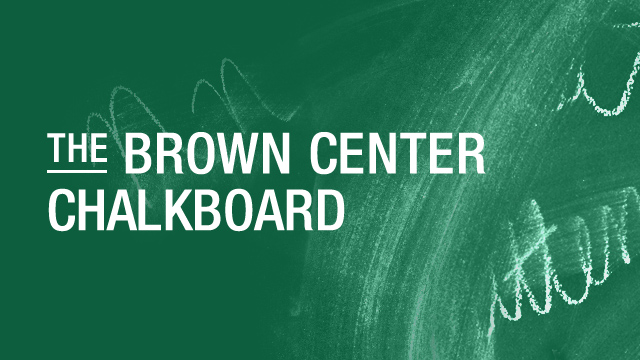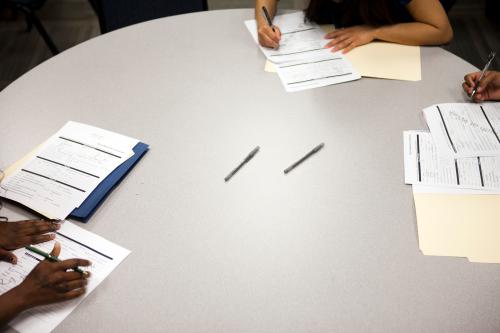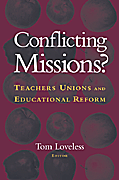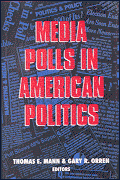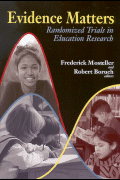Want to learn more? Sign up for our book event: Why knowledge matters in the Common Core era, featuring author E.D. Hirsch, Jr., on October 19, 2016 at 10:00 AM EDT.
EducationNext released their tenth annual poll of public attitudes on education issues at the end of August. It serves as a valuable barometer for where Americans stand on a number of school related policies. One strength of the poll is the consistency of the survey questions over time, which allows for a clearer view of trends in the education policy landscape. This feature helps to provide insight into the views that Americans have on the Common Core State Standards and how those views evolve.
Many states implemented the standards four years ago this fall. Overall support for the Common Core has been declining over this time, but this masks a considerable nuance in the diversity of opinions on the standards.
Teacher views
Educators have complex views on the Common Core. In 2012 and 2013, there was broad support for the Common Core among educators, though this has collapsed considerably in the years since. In 2016, the EducationNext poll found for the first time that more teachers opposed the Common Core (51 percent) than supported it (41 percent). It’s also noteworthy that the strength of the opposition has intensified. In 2016, more teachers strongly opposed the standards (32 percent) than somewhat opposed the standards (19 percent). It’s also worth noting that teachers now have a lower opinion of the standards than the nation overall.

Different polls, different opinions
However, these trends stand in stark contrast to other Common Core teacher opinions. Specifically, a 2014 Scholastic poll asked teachers about their opinions about the influence of the standards on their students’ learning. Most (70 percent) elementary and middle school teachers expected that Common Core will have a positive influence on their students’ achievement. The poll also noted an association between the degree of Common Core implementation and teachers reporting favorable student outcomes—teachers in schools where implementation was more mature reported the highest levels of positive student outcomes. Note that this is the same year that the EducationNext poll found just less than half of teachers expressing support for the standards.
So this is a bit of a puzzle—one survey shows strong views that improve with implementation, yet the other shows a major drop in support over the years coinciding with implementation. One possible explanation for the discrepancy is that the wording of the questions tapped into differing opinions about the influence of Common Core on students versus teachers. Teachers may be less supportive over time of EducationNext’s more general question about the Common Core because its implementation comes packaged with greater high-stakes accountability and test-based teacher evaluation policies, both of which may affect teachers’ pressures to perform. Yet, when the questions target students specifically, as the Scholastic poll does, those confounding (and unpopular) pressures are sifted away.
Partisan split
The politicization of this issue may be another factor contributing to declining support among teachers. There are substantive differences between how the two major parties view the Common Core, and how this has shifted over time. Rank-and-file Republicans, initially quite supportive, now firmly oppose the standards, and Republican presidential candidate Donald Trump has set opposition to standards at the core of his K-12 education platform. Democrats have relatively more positive views of the Common Core, as the figure below indicates. But, even among that group support is waning. 2016 was the first year that support for the Common Core dipped below 50 percent for Democrats.

Support for shared standards, just not the Common Core
There is some evidence that the public disapproves of the Common Core brand rather than shared state standards. In 2016, EducationNext finds that 42 percent of respondents support shared standards when they are described as the Common Core, but 56 percent support shared state standards when the Common Core brand is not mentioned. But even this hypothetical proposal seems to be growing unpopular. Over the past three years support for the same standards across the state has hovered in the mid-50s. Opposition to this hypothetical proposal has increased substantially, from 26 percent in 2014 to 41 percent in 2016.

Common Core’s future
The political future of the Common Core State Standards appears insecure, although some could look to this evidence and conclude that a reversal of current trends is possible. Many Americans remain supportive of common standards across states in theory (though opposition is growing quickly), and teachers have reported that the Common Core has exceeded their expectations in the classroom. Early research does suggest that the Common Core had a positive influence on student outcomes. In addition, it’s plausible that decoupling the Common Core from school accountability and teacher evaluation policies that are unpopular with educators could improve their political viability. Alternatively, if all stays the same and the popularity of the Common Core continues to decline at its current pace, then 2017 could be the year that states really start to reexamine the standards.
The Brookings Institution is committed to quality, independence, and impact.
We are supported by a diverse array of funders. In line with our values and policies, each Brookings publication represents the sole views of its author(s).


